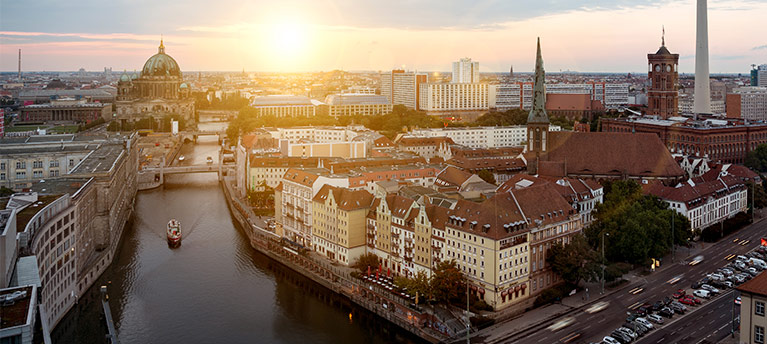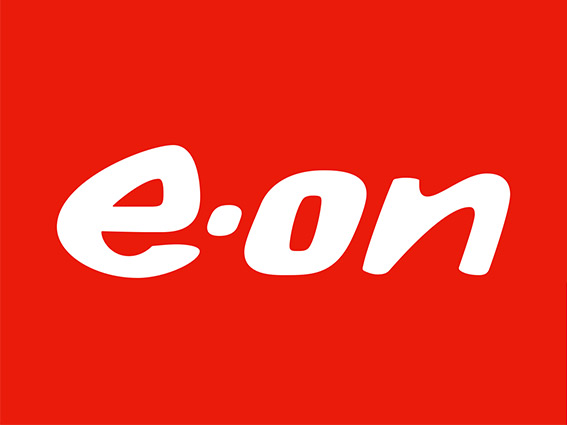

The 10 smartest cities in the world

Cities around the world are adopting new technologies and becoming smarter than ever
Artificial intelligence and automated technology are just some of the new solutions that are enabling cities to run more efficiently and smoothly. From resident-controlled street lights to rubbish bins with sensors, city-life is certainly getting more interesting.
As home to the majority of the world's most technologically-advanced metropolises, it's no surprise that Europe — and the UK in particular — is helping lead the charge for global innovation, according to IESE's 2020 Cities in Motion Index1. Dozens of nations worldwide are now vying to give their most celebrated destinations a futuristic upgrade, and the burgeoning field of smart cities is set to grow 22.9% annually to $545.7 billion by 20272.
No two cities are created equal and there's a lot we can learn from looking at what each does well. Here are 10 of the world's most technologically-advanced cities, and details on how they're aiming to give urban planning and sustainability an overhaul fit for the future.


London, UK
Consistently topping the list of the world's smartest cities, London scores highly for its open data initiatives. These are aimed at helping city leaders share information and make smarter decisions. It's also pushed for high-speed 5G and fibre-optic connectivity, and a host of civic-friendly high-tech programmes.
In addition to making a growing effort to install pollution-monitoring sensors and electric vehicle charging points around town, the global metropolis of 9 million is also challenging and incentivising startups to use technology to tackle issues ranging from traffic accidents to waste management. Government officials have made it a policy to exchange as much information as possible with the public, private, and academic sectors. This effort alone is fuelling many new collaborations that are producing a host of forward-thinking innovations.


Berlin, Germany
One of Germany's most celebrated cities has made a formal commitment3 to using information and communications technology (ICT) to improve sustainability, make its streets cleaner and more liveable, and reduce CO2 emissions, with its current target to be “climate neutral" by 2050. Moreover, the site of the former airport Tegel is now being converted into a hub for urban technology research and industry (an innovation park of sorts), to which E.ON will supply state-of-the-art heating and cooling via an environmentally friendly and energy efficient low-temperature network called LowEx. City leaders are paying attention to smart technologies that enable more efficient building heating and power solutions going forward. That's a smart move given that these energy needs now account for over half the EU's energy consumption4.


Amsterdam, The Netherlands
Imagine being able to pull tens of thousands of data points from every one of your town's districts and compare notes to identify rising patterns, spot opportunities and challenges, and make smarter decisions at a glance. It's possible in this Dutch city, which has built an open database of information for sharing amongst officials and residents. It's also invested in an array of smart grid projects to boost electricity production and distribute energy as needed on-demand. Select areas of town have also been fitted with adaptive LED street lights which adjust to match environmental lighting conditions, or automatically dim to conserve power. Even more impressive, they can be brightened on-demand by pedestrians and cyclists from their smartphone apps as needed.


Boston, USA
Promoting a vision of “participatory urbanism," Boston is working to offer citizens an array of apps for their every need — from finding parking to reporting emergencies and tracking the performance of public transport. It's also gone so far as to build its own civic crowd-funding platform to help citizens raise funds to create safe spaces where they can connect and share ideas with one another or enjoy events.
The town's smart streets initiative5 is further setting its sights on using cameras, artificial intelligence (AI) software, and road sensors to learn more about how people interact and navigate its streets – and how government officials can improve traffic safety and reduce accidents.


Malmö, Sweden
A former industrial heartland in Sweden is now doubling down on technological advancement and sustainability. E.ON is helping city leaders to achieve their goal of being carbon neutral by 2025 and run 100% of municipal operations on renewable sources by 2030. We are also aiding government officials to develop a climate smart district known as Hyllie, powered by an integrated, flexible, and intelligent energy infrastructure. This smart grid solution keeps a proactive eye on energy management, in addition to the storage and distribution of heating, cooling, and electricity. It also allows residents to tap into high-tech sources of information and optimise energy consumption by using interactive applications and smart visuals to monitor usage.


New York, USA
Determined to improve citizens' quality of life, conserve energy and water resources, and reduce the city’s impact on the environment, the NYC Mayor's Office of Technology and Innovation is giving America's crown jewel a much-needed upgrade. Just a few of the many enhancements being introduced include smart water metering to automatically monitor and regulate consumption and warn of potential leaks; mass installation of energy efficient LED lighting that can be dimmed via smart controls; and the introduction of air quality monitors around town to stay one step ahead of pollution. Home to the world's largest sanitation department, NYC has also rolled out smart bins equipped with wireless sensors that monitor rubbish levels and signal when pickup is needed. Meanwhile, built-in solar-powered rubbish compactors can increase bin storage capacity.


Singapore
Although technically a city-state, Singapore was the first metropolis in the world to kick off trials of driverless taxi fleets. A hotbed of innovation, it continues to steadily introduce a wide range of added health- and safety-focused advancements as well.
Residents also enjoy a variety of financial technology payment solutions for expedited transactions, and online access to a number of government systems via a single platform. Officials also recently announced that they are currently working to construct a new smart “eco-town" known as Tengah (consisting of 42,000 homes spread across five residential districts) that boasts automated waste collection, centralised cooling, and a town centre free of cars.


Hong Kong
This city is home to Smart City Blueprint6 that identifies 76 individual forward-thinking initiatives being undertaken in six areas of innovation: mobility, living, environment, people, government, and economy. Hong Kong has embraced the concept of digital transformation. Imagine a city where 95% of residents use cards and digital payment solutions instead of cash; airports let you check in and board without having to interact with other humans; and hundreds of electronic sensors enable traffic lights to provide adaptive responses to evolving road conditions.
5G high-speed wireless technology equips citizens with real-time updates on everything from bus schedules to traffic collisions and shifting weather conditions and there are over 37,000 free Wi-Fi hotspots located throughout town.


Dubai, UAE
Determined to become “the happiest city on Earth," Dubai has increasingly embraced a host of emerging technologies; from blockchain, which enables faster, more secure transactions, to artificial intelligence, capable of powering smarter decisions. In addition to aiming to go completely paperless this year by digitising all government transactions, Dubai has also reaffirmed its commitment to data science – including challenging government agencies to accelerate the collection and sharing of information.
The city has even built its own artificial intelligence smart lab with an eye towards crafting machine learning technologies, capable of getting smarter the more they're used, that can automatically oversee key aspects of city management. One thing to watch is a planned high-speed transit hyperloop to Abu Dhabi.


Oslo, Norway
A leader in the fight to address climate change, Norway's capital is setting its sights on powering up using renewable energy alone. In addition to installing a variety of sensors to optimise control of heating, lighting, and cooling around town, it's also looking to cut its carbon emissions down to virtually nothing by 2030. To accomplish these goals, Oslo has invested heavily in developing a smart energy grid and promoting the use of electric vehicles (EVs) and EV-charging solutions.
The city is already hailed as “the world's electric vehicle capital", home to over 50,000 EVs, more than any other city in the world per capita. Moreover, it also now uses a variety of Internet of Things solutions to govern key areas of city management such as energy, waste management, water usage, urban mobility, education, healthcare, and community services.
In short, Oslo is just another one of many top global destinations for IT pros and policy wonks – all of whom are growingly seeking to find ways to apply technology to make cities smarter, greener, and more cost-efficient going forward.
1 IESE Cities in Motion Index 2020
2 Globe News Wire: Smart Cities Market Worth $545.7 Billion by 2027
3 Senate Department for Urban Development and the Environment: Smart City Strategy Berlin
4 European Commission: Heating and cooling
5 Boston.gov: Smart streets
6 Hong Kong Smart City Blueprint 2.0
Share to:


Sustainable cities and communities
Find out how we're creating smart, sustainable cities and communities across the world.


Our blog
Read our latest blogs to discover how E.ON is leading the energy transition through smart and sustainable solutions.

